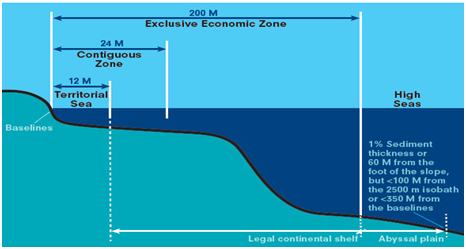

14th November 2022 (7 Topics)
Context
According to the Indian Navy, more than 200 Chinese fishing vessels have been monitored in the Indian Ocean in the year 2022, which further highlights the illegal, unreported, and unregulated (IUU) activities to continuerising beyond India’s Exclusive Economic Zone (EEZ).
About
What is an Exclusive Economic Zone (EEZ)?
- The EEZ is an area that is adjacent to and beyond the territorial sea. It can extend to a maximum of 200 nautical miles from the baseline.
- The baseline is normally measured as the low-water line along the coast as indicated on large-scale charts officially approved by the coastal state.
- The EEZ does not include the territorial sea and also does not include the continental shelf beyond 200 nautical miles.
- Activities allowed in EEZ are –
- creation and use of artificial islands
- Installations and structures
- Marine scientific research
- protection and preservation of the marine environment

Threats to India’s maritime sector
About India Maritime Strategy:
- India's territory with a huge coastline is vulnerable to the threats emerging from the maritime domain.
- Maritime terrorism (Mumbai attack of 26/11)
- China is rising, emerging as a serious challenger.
|
Governance of coastal security
|
Why maritime security is important for India?
- Water for trade: India’s major imports and exports are carried out through maritime water, thus enhancing the importance of securing coastlines is imperative for economic growth.
- Maritime threats: India’s huge coastline, around 7000km, increases the vulnerability to maritime threats as testified by the 26/11 Mumbai attacks.
- Blue economy: One of the major economic activities of the coastal states of India, comprising around 4% of the Indian economy, with immense future potential.
- Strategic Factor: Increasing Chinese influence and assertiveness in the Indian Ocean Region provides a potential threat to India’s regional interest.
- Ocean resource security and management of resources.
What are the persistent issues in Maritime Security?
- Piracy: One of the major persistent threats in maritime security is pirate attacks on ships and vessels.
- Terrorism: International waters provide a safe ground for terrorist organizations to execute their plan of action.
- Illegal migration: International waters serve as a safe gateway to enter into another country’s territory. A higher degree of illegal migration takes place through maritime water.
- Transnational Organised crimes: Maritime waters are also used for organized transnational crimes, impacting the global economy and security of the state like trafficking of drugs and narcotic substances, firearms, and humans.
- Environmental Concern: Rising pollution and climate change have threatened marine and aquatic lives along with creating a severe influence over natural calamities like floods and cyclones.
Mechanisms available for combating maritime security:
- United Nations Convention on the Law of the Sea (UNCLOS)provides a framework regarding the rights and responsibilities of the nations over international waters.
- SAGAR (Security and Growth for All in the Region) Doctrine: Indian initiative, aims to deepen the economic and security cooperation with its maritime neighbors, along with enhancing their security capabilities.
- Indo-Pacific Oceans’ Initiative (IPOI)
- QUAD initiative to ensure a safe, secure, and free Indo-Pacific region
What are the major challenges ahead of India’s maritime security?
- No proper legislative structure
- Transnational Interest
- Nonobedience over international laws and arbitration process
- Lack of Universal International laws over international waters
- Geopolitical dominance over a security interest
What should be done?
- Five points agenda on maritime security by UNSC:
- Free maritime trade without barriers to establishing legitimate trade;
- Settlement of maritime disputes should be peaceful and on the basis of international law only;
- Responsible maritime connectivity should be encouraged;
- Need to collectively combat maritime threats posed by non-state actors and natural calamities;
- Preserve the maritime environment and maritime resources.
- Diplomatic channels: Diplomatic channels should be fostered for better collaboration with the maritime neighbor states.
- Coastal development plans should be executed
- Involvement of state police in securing maritime borders.
- Vehicle monitoring system for the fishing vessels
- Satellite monitoring of weather forecast and disaster resilient preparedness
More Articles


